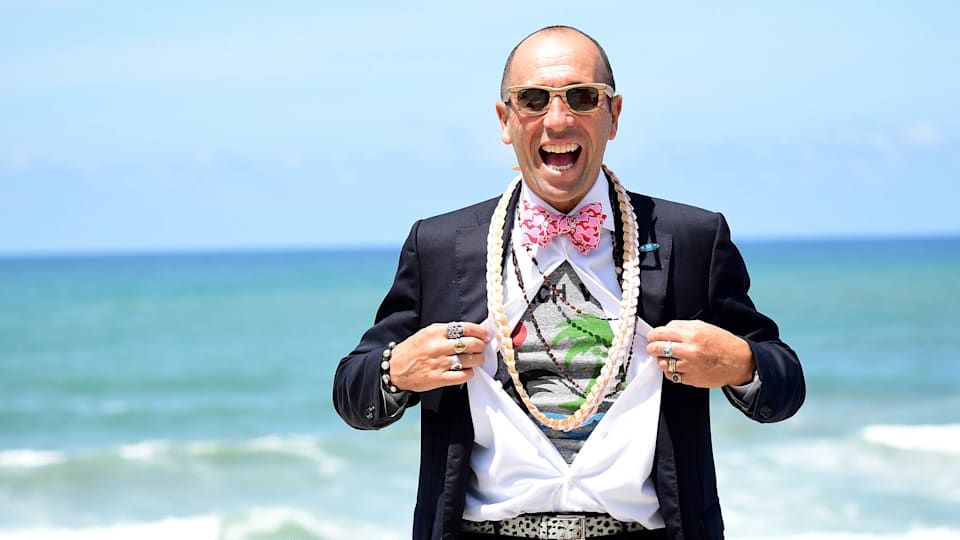Welcome to the world of surfing
Fernando Aguerre, president of the International Surfing Association (ISA), has dedicated much of the past two decades of his life to securing surfing a spot at the Tokyo 2020 Olympic Games. Here, the Argentinean re-lives the extraordinary journey to achieving his dream.

“My brother, who is an engineer and has quite a systematic mind, asked me a year ago after the IOC vote (approving the addition of surfing to the programme for the 2020 Games) ‘do you know how many hours you have put into this?’ I said, ‘of course not’ and he replied, ’12,000 hours,’” Aguerre laughed.
The Argentinean admits it “sounds like a lot” but then again his journey did begin back in 1994. Aguerre, then the newly-elected president of the ISA, got a letter from the IOC confirming official recognition for his organisation.
“I thought, bingo, I am in the Games and with Sydney six years away I was like ‘this is perfect, this is a dream’, but of course when I called them they said ‘no, no it doesn’t work like that’,” Aguerre explained.
“And then I realised I had been invited to the lobby of the hotel but the party was at the penthouse.”
The amiable Aguerre is quick to point out that, of course, surfing’s association with the Olympic Games in fact goes back long before his involvement. In 1920, Duke Kahanamoku, Hawaii’s three-time Olympic swimming gold medallist and the man hailed as the father of modern surfing, asked the IOC to consider including surfing.
“Now 100 years, that is a long time for anyone to wait,” said Aguerre, who became inspired, perhaps even obsessed, with Kahanamoku’s mission.
It’s an opportunity for a huge legacy, a cultural experience not just a sport competition! Fernando AguerrePresident International Surfing Association - Fernando AguerrePresident International Surfing Association
The now 59-year-old already had a history of beating formidable odds before he took on the Olympic challenge. A member of the first Argentinean team to compete at the World Surfing Championships, the avid sportsman founded and ran Argentina’s surfing association during the military dictatorship in the 1970s, even defying a local ban on the sport. He also found time to set up the iconic global surf brand, Reef.
All that, he acknowledges, was to prove wonderfully simple in comparison to completing Kahanamoku’s mission. After visiting Juan Samaranch in 1995 and giving the IOC President a surfing lesson on the floor of his office, things went a little flat for Aguerre.
“We had paddled out but there were no waves,” Aguerre said. “We kind of figured out that waves were going to come at some point but we didn’t really know when they were going to come because they were out of our control.”
By 2007/08 Aguerre had put his campaign into overdrive, attending IOC gatherings and meeting as many members as humanly possible. But surfing was, as he candidly admits, “so far out of the process”.
“For me the first indicator that there might be waves on the horizon was when I wrote to candidate Thomas Bach in mid-2013, talking about youth and action sports… and he responded positively,” Aguerre said.
“Then he got elected and started talking about Agenda 2020 and it was approved and then I realised this looked like real waves.”
Suddenly things began to tumble into place. First, in 2015 surfing was unanimously voted on to the programme for the 2019 Pan American Games, in Lima, Peru. And then came the big one, in Rio de Janeiro, on the eve of the 2016 Olympic Games.
The “real work” has started now and the high is, for Aguerre, clearly still intoxicating.
“Now they (young people) don’t need to become tennis players or track and field athletes, they can be surfers and Olympians,” the Argentine said with obvious pride.
An impressive 47 teams took part in the ISA’s World Surfing Games in Biarritz, France this year, up from 26 in 2015. The potential for smaller nations to exponentially grow their participation and success rates excites Aguerre.
“Some of the best waves in the world happen in the poorest nations of the world. These are free playgrounds and there are not many of those,” he said.
This, combined with an ever narrowing gender gap – the World Surf League’s Championship Tour hands out equal prize money per surfer for women and men – animates Aguerre even further.
“It’s great for society which has been unfairly treating women for thousands of years,” he said. “In the ocean it doesn’t matter, the ocean doesn’t care if you are Bill Gates’ son or the son of the janitor, black, white, poor, old, young, male or female or anything else.”
Naturally, the ISA president is not limiting his focus to the Tokyo Games in three years’ time and is openly delighted to have both Paris and Los Angeles on the horizon, places that “really get the action sports culture”. But first, 2020. Plans are being made for a surfing festival with yoga, art, music, coaching and environmental discussions all set to light up Tsurigasaki beach, 90km south-east of Tokyo.
“It’s an opportunity for a huge legacy, a cultural experience not just a sport competition,” Aguerre said.
But when he looks back on the 12,000 hours and considers all the skills he might have mastered in that time, has it truly been worth his dedication?
“Knowing what I know now I would have taken it (inclusion in 2020) but knowing what I knew then, I would have probably said, ‘that’s a quarter-of-a-century away, are you kidding me?’” he laughed again.
“But I guess the best cake takes a long time in the oven.”
